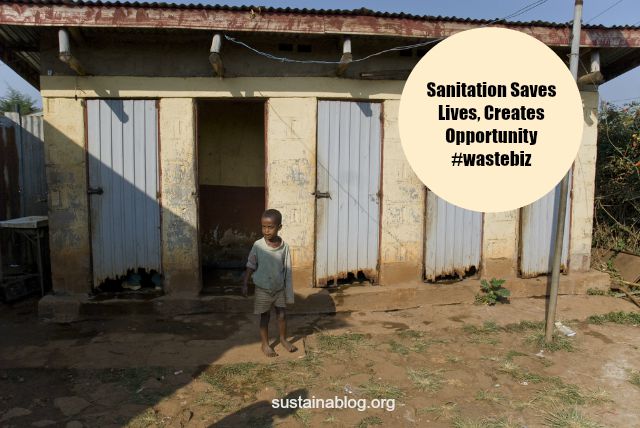Our normal response to human waste: get it away from me as quickly as possible… right? That mindset seems to underscore the modern sewage system: we’ll use whatever resources necessary to get that yucky stuff on its way. Those systems create one big advantage, though: they nearly eliminate the health hazards posed by “doing our business” out in the open, or in shared water sources. As Gabriella Mulligan points out in an article for ensia, “In Kenya alone, the Water and Sanitation Program (part of the World Bank Group’s Water Global Practice) estimates that 19,500 people — including 17,100 children under five years old — die each year from diarrhea, 90 percent of which is caused by bad sanitation.”
As we’ve pointed out over and over again, bad sanitation practices aren’t just unhealthy, but also wasteful. Human waste (as well as other animal waste) can be turned into a number of useful things, from energy to drinking water (really!). If our approach to sewage shifts from “get it away from me” to “let’s collect and make use of this stuff,” we can save lives while creating economic opportunity.
Mulligan points out three small businesses in Kenya doing just that: turning human waste into fuel.
- Sanivation turns human waste into fuel briquettes that can be used in place of charcoal or wood;
- Afrisol Energy uses anaerobic digesters to turn waste into biogas; and
- Sanergy turns waste into organic fertilizers and other agricultural products.
While each company is unique in terms of its business model, they each are addressing the sanitation crises in Kenya, as well as the overuse of other resources (like wood for fuel). Dig into the article, and then feel free to share other entrepreneurial efforts to address issues surrounding human waste disposal…
In other waste biz news:
Ford’s R&E Center goes landfill-free: The car makers sure are making impressive strides on eliminating waste. Ford’s the latest on this front, with an announcement that their huge research and engineering center in Dearborn, Michigan, has achieved landfill-free status.
Philippine fishermen collect “ghost” nets for recycling: Fishing nets left to rot on the ocean floor present a hazard to fish… and, by extension, the fishermen who leave them there. The Networks program gives Philippine fishermen an incentive to collect those old nets: better fishing stock, and payment for the material itself. Interface – which runs the program – buys those old nets for recycling into carpet.
Photo credit: Clive Chilvers / Shutterstock.com


allpurposeguru
When you stop to think about it, we get our drinking water from sewage as it is: sewage to wastewater treatment plant to river (or other body of water) to water treatment plant. But the water treatment plant only uses part of the discharge from the wastewater treatment plant. The rest goes to the ocean–very expensive for California now! “Toilet to tap” merely cuts out the “middleman” (the river). Places in the world without wastewater treatment plants can potentially leapfrog over the “developed” world.
Jeff McIntire-Strasburg
Interesting way of thinking about this… and spot on.